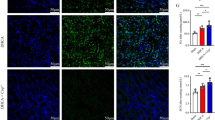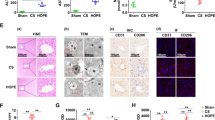Abstract
Liver ischemia reperfusion injury (IRI) is a serious complication of certain liver surgeries, and it is difficult to prevent. As a potential drug-free treatment, mild hypothermia has been shown to promote positive outcomes in patients with IRI. However, the protective mechanism remains unclear. We established in vivo and in vitro models of hepatic ischemia reperfusion (IR) and mild hypothermia pretreatment. Hepatocytes were transfected with RNA-binding motif protein 3 (RBM3) overexpression plasmids, and IR was performed. Cell, culture medium, blood and tissue samples were collected to assess hepatic injury, oxidative stress, apoptosis and changes in RBM3 expression in the liver. Upregulation of RBM3 expression by mild hypothermia reduced the aminotransferase release, liver tissue injury and mitochondrial injury induced by liver IR. Hepatic IR-induced p38 and c-Jun N-terminal kinase (JNK) signaling pathway activation, oxidative stress injury and apoptosis could be greatly reversed by mild hypothermia. Overexpression of RBM3 mimicked the hepatoprotective effect of mild hypothermia. Mild hypothermia protects the liver from ischemia reperfusion-induced p38 and JNK signaling pathway activation, oxidative stress injury and apoptosis through the upregulation of RBM3 expression.









Similar content being viewed by others
Data availability
The datasets used and analyzed during the current study available from the corresponding author on reasonable request.
References
Jochmans I, Meurisse N, Neyrinck A et al (2017) Hepatic ischemia/reperfusion injury associates with acute kidney injury in liver transplantation: prospective cohort study. Liver Transpl 23:634–644
Gendy A, Elnagar MR, Soubh A et al (2021) Morin alleviates hepatic ischemia/reperfusion-induced mischief: In vivo and in silico contribution of Nrf2, TLR4, and NLRP3. Biomed Pharmacother 138:111539
Du P, Zhang X, Luo K et al (2022) Curculigoside mitigates hepatic ischemia/reperfusion-induced oxidative stress, inflammation, and apoptosis via activation of the Nrf-2/HO-1 pathway. Hum Exp Toxicol 41:9603271221087146
Liu Y, Qin X, Lei Z et al (2021) Tetramethylpyrazine inhibits neutrophil extracellular traps formation and alleviates hepatic ischemia/reperfusion injury in rat liver transplantation. Exp Cell Res 406:112719
Czigany Z, Pratschke J, Fronek J et al (2021) Hypothermic oxygenated machine perfusion reduces early allograft injury and improves post-transplant outcomes in extended criteria donation liver transplantation from donation after brain death: results from a multicenter randomized controlled trial (HOPE ECD-DBD). Ann Surg 274:705–712
Behrends M, Hirose R, Serkova NJJ et al (2006) Mild hypothermia reduces the inflammatory response and hepatic ischemia/reperfusion injury in rats. Liver Int 26:734–741
Polderman KH (2004) Application of therapeutic hypothermia in the intensive care unit. Opportunities and pitfalls of a promising treatment modality–Part 2: Practical aspects and side effects. Intensive Care Med 30(5):757–769
Yang D, Guo S, Zhang T et al (2009) Hypothermia attenuates ischemia/reperfusion-induced endothelial cell apoptosis via alterations in apoptotic pathways and JNK signaling. FEBS Lett 583(15):2500–2506
Oyama Y, Ono K, Kawamura M Jr (2020) Mild hypothermia protects synaptic transmission from experimental ischemia through reduction in the function of nucleoside transporters in the mouse hippocampus. Neuropharmacology 163:107853
Wei S, Sun J, Li J et al (2013) Acute and delayed protective effects of pharmacologically induced hypothermia in an intracerebral hemorrhage stroke model of mice. Neuroscience 252:489–500
Xiao Q, Ye QF, Wang W et al (2017) Mild hypothermia pretreatment protects hepatocytes against ischemia reperfusion injury via down-regulating miR-122 and IGF-1R/AKT pathway. Cryobiology 75:100–105
Roobol A, Carden MJ, Newsam RJ et al (2009) Biochemical insights into the mechanisms central to the response of mammalian cells to cold stress and subsequent rewarming. FEBS J 276:286–302
Wong JJ, Au AY, Gao D et al (2016) RBM3 regulates temperature sensitive miR-142–5p and miR-143 (thermomiRs), which target immune genes and control fever. Nucleic Acids Res 44:2888–2897
Dresios J, Aschrafi A, Owens GC et al (2005) Cold stress-induced protein Rbm3 binds 60S ribosomal subunits, alters microRNA levels, and enhances global protein synthesis. Proc Natl Acad Sci USA 102:1865–1870
Wellmann S, Truss M, Bruder E et al (2010) The RNA-binding protein RBM3 is required for cell proliferation and protects against serum deprivation-induced cell death. Pediatr Res 67:35–41
Miao X, Zhang N (2020) Role of RBM3 in the regulation of cell proliferation in hepatocellular carcinoma. Exp Mol Pathol 117:104546
Zhang J, Chai W, Xiang Z et al (2021) MZF1 alleviates oxidative stress and apoptosis induced by rotenone in SH-SY5Y cells by promoting RBM3 transcription. J Toxicol Sci 46:477–486
Elias-Miró M, Jiménez-Castro MB, Rodés J et al (2013) Current knowledge on oxidative stress in hepatic ischemia/reperfusion. Free Radic Res 47:555–568
Konishi T, Lentsch AB (2017) Hepatic ischemia/reperfusion: mechanisms of tissue injury, repair, and regeneration. Gene Exp 17:277–287
Qi X, Qifa Ye, Wei W et al (2017) Mild hypothermia pretreatment protects against liver ischemia reperfusion injury via the PI3K/AKT/FOXO3a pathway. Mol Med Rep 16(5):7520–7526
Flameng W, Borgers M, Daenen W et al (1980) Ultrastructural and cytochemical correlates of myocardial protection by cardiac hypothermia in man. J Thorac Cardiovasc Surg 79:413–424
Suzuki S, Toledo-Pereyra LH, Rodriguez FJ et al (1993) Neutrophil infiltration as an important factor in liver ischemia and reperfusion injury modulating effects of FK506 and cyclosporine. Transplantation 55(6):1265–1272
Xia Z, Wang W, Xiao Q et al (2018) Mild hypothermia protects renal function in ischemia-reperfusion kidney: an experimental study in mice. Transplant Proc 50:3816–3821
Spencer NY, Zhou W, Li Q et al (2013) Hepatocytes produce TNF-α following hypoxia-reoxygenation and liver ischemia-reperfusion in a NADPH oxidase- and c-Src-dependent manner. Am J Physiol Gastrointest Liver Physiol 305:G84-94
He H, Xiong L, Jian L et al (2022) Role of mitochondria on UV-induced skin damage and molecular mechanisms of active chemical compounds targeting mitochondria. J Photochem Photobiol B 232:112464
Zhuang RJ, Ma J, Shi X et al (2017) Cold-inducible protein RBM3 protects UV irradiation-induced apoptosis in neuroblastoma cells by affecting p38 and JNK pathways and Bcl2 family proteins. J Mol Neurosci 63:142–151
Wu X, Gu W, Lu H et al (2016) Soluble receptor for advanced glycation end product ameliorates chronic intermittent hypoxia induced renal injury, inflammation, and apoptosis via P38/JNK signaling pathways. Oxid Med Cell Longev 2016:1015390
Tolosa L, Mir M, Olmos G et al (2009) Vascular endothelial growth factor protects motoneurons from serum deprivation-induced cell death through phosphatidylinositol 3-kinase-mediated p38 mitogen-activated protein kinase inhibition. Neuroscience 158:1348–1355
Kobayashi M, Takeyoshi I, Yoshinari D et al (2006) The role of mitogen-activated protein kinases and the participation of intestinal congestion in total hepatic ischemia-reperfusion injury. Hepatogastroenterology 53(68):243–248
Yoshinari D, Takeyoshi I, Kobayashi M et al (2001) Effects of a p38 mitogen-activated protein kinase inhibitor as an additive to university of wisconsin solution on reperfusion injury in liver transplantation. Transplantation 72(1):22–27
Yamaguchi K, Kawahara T, Kumakura S et al (2010) Effect of olprinone, a phosphodiesterase III inhibitor, on hepatic ischemia-reperfusion injury in rats. Shock 33:436–441
Rao J, Zhang C, Wang P et al (2010) All-trans retinoic acid alleviates hepatic ischemia/reperfusion injury by enhancing manganese superoxide dismutase in rats. Biol Pharm Bull 33:869–875
Uehara T, Peng XX, Bennett B et al (2004) c-Jun N-terminal kinase mediates hepatic injury after rat liver transplantation. Transplantation 78:324–332
Kaizu T, Ikeda A, Nakao A et al (2008) Protection of transplant-induced hepatic ischemia/reperfusion injury with carbon monoxide via MEK/ERK1/2 pathway downregulation. Am J Physiol Gastrointest Liver Physiol 294:G236–G244
Toledo-Pereyra LH, Lopez-Neblina F, Toledo AH (2008) Protein kinases in organ ischemia and reperfusion. J Invest Surg 21:215–226
Danno S, Nishiyama H, Higashitsuji H et al (1997) Increased transcript level of RBM3, a member of the glycine-rich RNA-binding protein family, in human cells in response to cold stress. Biochem Biophys Res Commun 236:804–807
Acknowledgements
Not applicable.
Funding
This study was supported by National Natural Science Foundation of China (No:82060122). Natural Science Foundation of Jiangxi Province (no. 20212BAB206027, 20212BAG7001). Project of Jiangxi Provincial of Education Department (GJJ180014, GJJ200142). Project of Chinese medicine Administration of Jiangxi Provincial of Health Commission (2019A304, 2018A366), Project of Jiangxi Provincial of Health Commission (202130242, 20175074).
Author information
Authors and Affiliations
Contributions
QX participated in the performance of the research design, data analysis and article writing. YL prepared Fig. 1–7, XJZ and ZZL participated in the performance of data analysis, JSX participated in the performance of the research. QFY and BQF participated in research design, discussion, and article revision. All authors reviewed the manuscript.
Corresponding authors
Ethics declarations
Conflict of interest
We declare that we have no conflict of interests.
Ethical approval
the protocols of animal experiments were approved by the Animal Ethics Committee of Wuhan University.
Consent for publication
Not applicable.
Additional information
Publisher's Note
Springer Nature remains neutral with regard to jurisdictional claims in published maps and institutional affiliations.
Rights and permissions
Springer Nature or its licensor holds exclusive rights to this article under a publishing agreement with the author(s) or other rightsholder(s); author self-archiving of the accepted manuscript version of this article is solely governed by the terms of such publishing agreement and applicable law.
About this article
Cite this article
Xiao, Q., Liu, Y., Zhang, X. et al. Mild hypothermia ameliorates hepatic ischemia reperfusion injury by inducing RBM3 expression. Apoptosis 27, 899–912 (2022). https://doi.org/10.1007/s10495-022-01757-6
Accepted:
Published:
Issue Date:
DOI: https://doi.org/10.1007/s10495-022-01757-6




